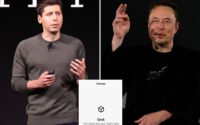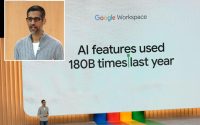Google’s AI technology could entrench online search monopoly
Lawmakers and antitrust watchdogs are sounding the alarm over Google’s development of advanced AI products – warning the tech giant’s alleged monopoly over online search will only become more entrenched without federal intervention.
In the landmark antitrust trial targeting Google’s search empire, the Justice Department has mostly focused on the company’s past tactics.
The feds have argued that Google has spent more than $10 billion a year on deals ensuring its search engine is enabled by default on most devices, allowing the company to control a roughly 90% share of the market.
However, some critics of Google’s business practices, including Rep. Ken Buck (R-Colo.), point out that the company is already pursuing the next evolution of search in the form of AI tools such as the company’s Bard chatbot – a so-called “large language model” that can provide human-like responses to an endless variety of user queries.
Buck said the competition concerns around Google’s business will “absolutely” get worse as Bard and other AI technology is gradually integrated into its omnipresent search engine – unless Congress takes action.
“If there’s one thing we’ve learned from how Congress legislated in the internet space early on, it’s that we need to continue to be involved,” Buck told The Post. “These companies are very manipulative and very good at what they do in preventing competition. We need to make sure that we identify those areas and we give regulators the authority to go in.”
When reached for comment, a Google spokeswoman claimed that there is already a “huge amount of competition and investment in AI both from new players and existing companies.”
“Some of the world’s leading AI labs like OpenAI and Anthropic started with no proprietary data,” the spokeswoman said. “We offer numerous tools to help others innovate and have advanced research by releasing dozens of datasets, from annotated text to images to videos and more.”
AI’s looming takeover of online search emerged as a point of debate at the trial on Oct. 2, when Microsoft CEO Satya Nadella delivered bombshell testimony saying Google’s default deals make the notion of user choice “completely bogus.”
Microsoft has sought to chip away at Google’s lead by pouring billions into OpenAI, the maker of ChatGPT, and integrating its AI chatbot into Bing search. Google has argued that Microsoft’s investments in AI are a sign of fierce competition in the sector.
But Nadella downplayed the notion that Microsoft’s investments have meaningfully impacted the search market, where Bing holds a 3% market share compared to Google’s 90%.
The Microsoft boss also told the court that AI would result in “even worse of a nightmare to make progress in search” if Google bolstered its advantage by securing exclusive content deals to support Bard while locking out rivals.
Google said it does not have any such exclusive deals with publishers and asserts that its AI models are primarily trained on publicly available data.
In less-guarded moments, Google CEO Sundar Pichai has pooh-poohed the idea that chatbots from rival companies would hurt Google’s search business, telling the the Wall Street Journal that the “opportunity space, if anything, is bigger than before.”
Pichai personally acknowledged the connection between Bard and the company’s long-term ambitions for its search business. In the April interview with the Journal, Pichai said that AI would “supercharge” Google search, though he did not say when the integration might occur.
For now, Bard is labeled as an “experiment” on Google’s website and kept separate from its main search engine.
Users are warned that it is a work in progress that occasionally spits out false or inaccurate information – such as a recent incident in which Bard said Israel and Hamas had reached a ceasefire following the recent outbreak of war in Gaza, even though no such deal had occurred.
Despite Bard’s early hiccups, Luther Lowe, a former top policy executive at Yelp, warned last month that companies “like Google and Microsoft are already leveraging their existing dominance to control critical AI applications and data sets” in a way that curbs consumer choice and tech innovation.
“Google is planning to hardwire Bard into its search engine after an initial beta launch, which means most Americans will get their first earnest experience of AI through Google search,” Lowe wrote in an op-ed. “The average user likely won’t recognize that Google has silently made Bard their default chatbot either, stifling competition and innovation from the start.”
“After all, how can any AI startup compete with a chatbot that’s embedded within any search query made through the world’s most visited website?” he added.
Congressional action is likely necessary to properly address the competition concerns around AI, according to Christine Bartholomew, a professor at University at Buffalo School of Law who specializes in antitrust litigation.
“The danger from AI tools depends on who uses them. It is significantly different for Google than for a small start-up to use such technology,” Bartholomew said.
“The antitrust laws are broad enough to address these dangers,” she added. “Judicial interpretations of such laws, however, have become so narrow that I worry whether existing antitrust jurisprudence will accurately sort through such distinctions.”
Meanwhile, Sen. Josh Hawley (R-Mo.), another outspoken Big Tech critic and a member of the Senate Judiciary Committee, reiterated his long-held view that a breakup of Google is the “only answer” to ensure fair market competition as AI products take hold.
“There’s no online market Google won’t try to conquer,” Hawley said in a statement to The Post. “Google has vast reserves of Americans’ personal information, and it’s a small step to use that information to train the company’s AI models. In other words: like so many other tech firms, Google’s power is endlessly self-reinforcing.”
While the current federal antitrust trial could have major implications for Google and the rest of the tech industry, any such outcome is likely years away. Judge Amit Mehta will first determine whether Google broke antitrust law in a ruling that is not expected until earlier next year.
If Google is found to have broken the law, the second trial will be held to determine a proper remedy – with potential outcomes ranging from a forced discontinuation of some of Google’s business practices to a breakup of the company.
“This kind of case is a case where new law may be made and it may go up to the Supreme Court and then you’re looking at a settlement,” said Buck. “Whatever the judge does here is really the foundation for where this case is going to end up.”
“I do think that, factually, the government has done a good job in providing a strong argument,” Buck added.


